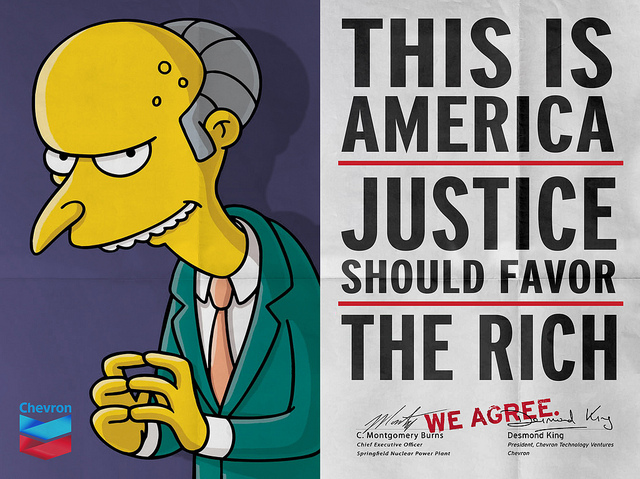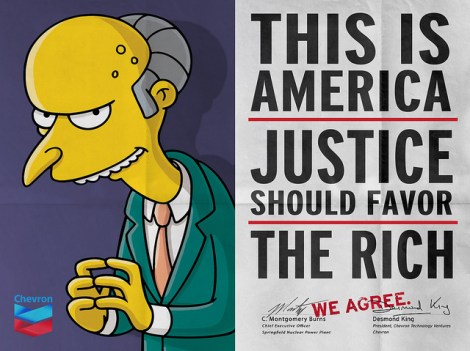You’re probably familiar with the longstanding, pedantic dispute over use of the word “irony.” Well, a bit of good news for the holiday: We now have an example of irony that will stand the test of time. An example of irony that is so obvious and appreciable that when, several millennia from now, people are arguing about Alanis Morissette, the debate will be curtailed when someone notes this news story.
For you see, Chevron has filed a complaint against the comptroller of New York, suggesting that he was unduly influenced to criticize the company due to campaign contributions he received. Chevron. Complained about how campaign contributions influenced an elected official.
Can. You. Fucking. Imagine.
From The New York Times:
The Chevron Corporation filed a complaint on Tuesday against the New York State comptroller, Thomas P. DiNapoli, with the state ethics commission, the latest round in its battle over an Ecuadorean lawsuit stemming from pollution of the Amazon rain forest.
Mr. DiNapoli and Gov. Andrew M. Cuomo have received tens of thousands of dollars in contributions from people with ties to lawyers representing Ecuadorean villagers who brought the litigation against Chevron. Both officials have also raised questions about Chevron’s conduct …
The complaint, which was made to the Joint Commission on Public Ethics, claims that Mr. DiNapoli and the plaintiffs’ lawyers had “an illicit and unethical quid pro quo arrangement” in which the comptroller received campaign donations and other benefits in exchange for pressuring Chevron. The complaint, however, is short on evidence of such an arrangement.
The story, in short: In 1993, residents of a village in the Ecuadorean rain forest sued Texaco (now part of Chevron) for polluting their land. NPR described the damage in 2009:
After tramping through the jungle, [activist Donald] Moncayo reaches a huge pool of oily sludge and sticks a long pole into the muck. He says this is a legacy of Texaco’s quarter-century in Ecuador: pollution that affects tens of thousands of people who bathe and drink from rain forest waterways.
He says mud and other waste produced by drilling and production were dumped in the pit, and the toxins here and in hundreds of similar unlined pits leaked into the ground. A court-appointed geologist, Richard Cabrera, and his 14-member scientific team found barium, lead and other heavy metals in those pits.
In February 2011, a court in Ecuador fined Chevron $18 billion. Chevron, true to form, has challenged the verdict.
But all of that aside, the chutzpah of Chevron worrying that contributions influence elected officials is pretty amazing. I am not in the least surprised that Chevron assumes a politician speaking out on an issue is only doing so because that official received some contribution or benefit; after all, this is the entirety of Chevron’s political strategy. (A bunch of suits sit around a conference table. “How should we get votes to maintain our tax break?” one guy asks. A brief silence. “Maybe we should make massive campaign contributions to Republicans?” another offers. A murmur of approval, some appreciation for that savvy, and the meeting adjourns.)
Remember: Chevron made the largest political contribution from a publicly traded company in history earlier this year, to a pro-Republican super PAC. This is how Chevron does business. And apparently it assumes that this is how rain forest activists do business, too. Why on Earth else would anyone stick up for them?
Finally, here’s a quote for the record books.
“Mr. DiNapoli’s actions serve only his political patrons, not the citizens of the State of New York,” said Hewitt Pate, Chevron vice president and general counsel, in a statement. “This type of quid pro quo behavior is an apparent breach of ethical and legal responsibilities that warrants investigation.”
If any single Chevron lobbyist shows up on Capitol Hill or any bigwig shows up at a fundraiser without that quote being thrown in his face, American democracy has failed. More.
Isn’t it ironic. (Don’t you think?)



